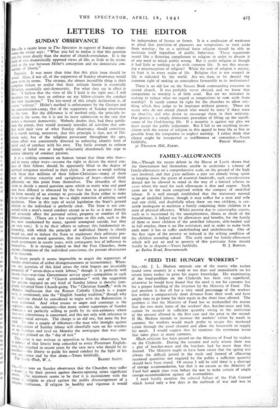S I 3 L—Your note on Sunday observance that the Churches may suffer
a disserv:,:e by their protest against theatre-opening raises significant nature '[he argument seems to be thai it is inconsistent with the
"mare religion to plead against the public discouragement of a relicitis Institution. If religion be healthy and vigorous it would be independent of favour or frown. It is a confession of weakness to plead that provision of pleasures are temptations to turn aside from worship ; for as a spiritual force religion should be able to maintain itself regardless of public behaviour. These arguments sound like a flattering compliment to religion in order to disarm it of any need to attack public wrong. But it exalts religion as though it had little or nothing to do with common life. Is not this reason- ing a misconception of religion? While the root of religion is mystic, its fruit is in every realm of life. Religion that is not steeped in life is ridiculed by the world. Are we, then, to be. denied the common right of seeking an atmosphere favourable to its institutions?
There is an old law on the Statute Book commanding everyone to attend church. It was probably never obeyed, and we know that compulsion to worship is of little avail. But are we mistaken in seeking to reduce what we regard as temptations to turn aside from worship? It surely cannot be right for the churches to allow any- thing which they judge to be improper without protest. There are many who do not attend church who would be sorry 'if there were no churches and who desire to encourage them in their ministry. Our protest is a simple democratic procedure of lifting up the signifi- cance of the God-fearing life. If a majority is against our plea we must accept the public judgement. But I fail to see-anything incon- sistent with the nature of religion in this appeal to keep life as free as possible from the temptation to neglect worship. I rather think that silence might be interpreted as indifference or cowardice.—Yours


























 Previous page
Previous page